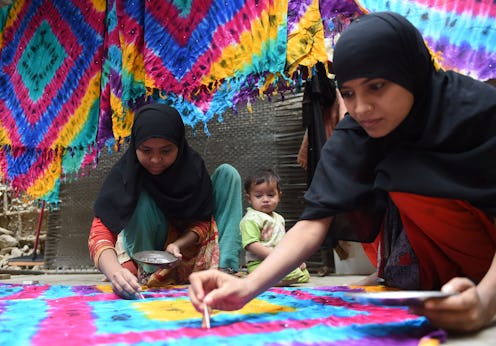News
Celebrate Gender Equality Progress On IWD
For more than a century, International Women's Day celebrations have been organized to commemorate women's economic, political, and social achievements while raising civil awareness about the global struggles they still face. This year, No Ceilings: The Full Participation Project is hoping that the world will celebrate International Women's Day by reflecting on women's progress toward achieving gender equality, because it's true what they say: You don't know where you're going until you know where you've been.
In order to evaluate the economic, political, and social hurdles that still stand before women, it's important to measure exactly how much progress has been made in gender equality worldwide. Launched as a Clinton Foundation initiative last year, No Ceilings: The Full Participation Project aims to help the world better understand the current state of gender equality, with the hope that a clearer picture will advance the full participation of women and girls around the world. The group provides a data-driven evaluation of efforts to obtain gender equality worldwide, and outlines many of the roadblocks that are keeping women from reaching full participation.
"In order for us to close the gender gap, we need to know where we are currently," No Ceilings Director Terri McCullough tells Bustle. "We looked at the span of progress for women and girls over the last 20 years, and we found a number of things to celebrate."
Now more than ever before, women are living longer and healthier lives, according to data analyzed by No Ceilings. Maternal mortality rates have decreased by almost half. Girls' access to primary school has increased so dramatically that the gender gap in that area has virtually closed globally. The number of women living in extreme poverty worldwide has gone down by half since 1995. But No Ceilings' data demonstrates that there is still work to be done.
That the more we ensure that girls and women have the right to participate, the more they will participate to benefit all.
Although No Ceilings found a 90 percent rate of global female enrollment in primary school, the rate dropped to 63 percent when looking at secondary school. Moreover, girls and women pursued education in STEM fields — where many of the best-paying jobs are — at a disproportionately lower rate than their male counterparts.
"Education is key to opening up so many opportunities for girls. We can’t emphasize that enough," McCullough says, citing the far-too-slow decline of child marriage practices as a major factor undermining girls' access to education.
Another thing No Ceilings found troublesome was how the workforce gender gap has remained virtually unchanged in 20 years, despite the fact that increasing women's participation in the labor force could potentially lead to $28 trillion in economic growth.
"One of the things we’re trying to do here in sharing this information and making an evidence-based case to ensure rights and opportunities for girls and women is show that there is an economic case to be made," McCullough says. "The more we ensure that girls and women have the right to participate, the more they will participate to benefit all."
A scarcity of gender-desegregated data from several countries and issue areas, however, may prove to be one of the more prominent challenges holding back gender equality. This lack of data results in limited insights into the struggles women face, which hinders policymakers in addressing those issues.
Despite evidence the battle for gender equality is far from won, No Ceilings' report makes it clear that progress is happening, and the actions and efforts of individuals are making a difference. "[The data] is both a celebration and a clear indicator that an individual or an organization can really make a difference on these issues of gender equality," McCullough says. "They can really change the conversation; they can really change the culture."
